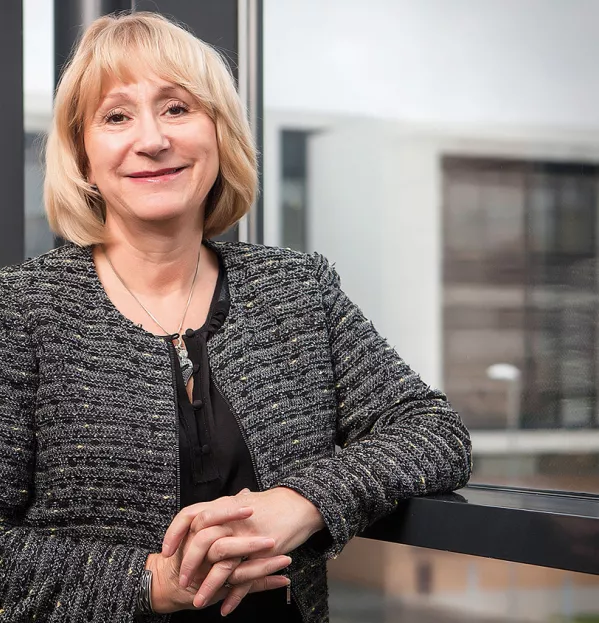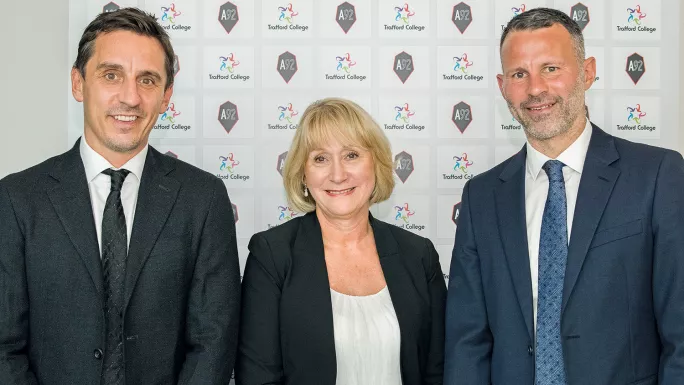
‘It has been on my wish list for such a long time’

GCSE results day usually marks the end of the busiest time of the year for Lesley Davies. During her five years spent in senior roles at awarding body Pearson, the end of the exam season brought a welcome opportunity to pause for breath.
Not this year. After a quarter of a century working in and around the FE sector - including a stint as deputy chief executive of the Association of Colleges (AoC) - she has finally fulfilled a long-held ambition to lead her own college. Now established in the principal’s office at Trafford College, Davies is acutely aware that, in her new job, the hard work starts here.
“When you’re with an awarding body, the main kind of activity is just coming to an end about now,” she says.
“You’ve been through all the scripts that have been marked, all the grade boundaries have been set, and your main aim is ensuring the grades are valid and reliable, and all the young people and adults get the results on the right day. Whereas for us, our work starts as exam results are delivered.
“We’ll be checking the results against what our predictions were; we’ll be checking the performance of each student and be ready to talk to them. It may be that some students haven’t got what they had hoped, so it’s about sitting down and talking with them about what they might do next.”
While the reformed GCSE and A-level specifications have made the 2017 exam session particularly challenging across England, colleges and schools in Greater Manchester have had an altogether more traumatic situation to deal with. On 22 May - just days into exam season - Salman Ramadan Abedi detonated a shrapnel-packed homemade bomb at the Manchester Arena, as thousands of people were leaving an Ariana Grande concert. Twenty-three people were killed (including Abedi), and 250 more sustained injuries.
“It was just awful for everyone,” recalls Davies. “We were fortunate we didn’t have any casualties from this college, but some of our students did know people who were in the arena who were injured or worse. It had repercussions for them in the sense of feeling safe, especially around exam time. We put on extra counselling; we made sure tutors spoke to students; we made sure they could access support should they need it.
“It was amazing to see their resilience and their maturity. They showed amazing calmness going into their exams. They were determined to carry on and that it wasn’t going to put them off their goals, even though they were very upset.”
Circling back to college
After initially working as a school teacher, Davies’ first taste for the FE sector was when she became a lecturer at Oaklands College in Hertfordshire. She spent eight years teaching NVQs, BTECs and HNDs.
Davies’ next role came when she joined the newly formed Training Standards Council, which inspected work-based training before the remit was eventually passed to Ofsted. At this point, she made the move to the former Learning and Skills Council, where she spent three years, culminating in her appointment as director for the Framework for Excellence.
Then, after another three-year stint, this time at the AoC, Davies joined Pearson, becoming director (and later vice-president) for quality, standards and research. She spent her final 11 months at the firm as vice president for BTECs and apprenticeships. And then the opportunity to fulfil her long-held ambition of becoming a college principal - “It’s been on my wish list for such a long time,” she says - finally arose.
When Davies joined Trafford in November, it was locked in merger talks with the LTE Group. Despite the very real prospect of Trafford becoming part of the UK’s largest college group, Davies was undeterred; by the end of the year, the merger had been ruled out. The decision was amicable, she insists.
Sizeable cohort
“The governing body decided that, no, that wasn’t exactly the right thing to do at the moment and therefore we - in collaboration with the LTE Group - decided at Christmas that we wouldn’t be developing those early talks,” Davies explains. Trafford is now in merger talks with another neighbouring college, Stockport. “Culturally it’s a good fit and it’s a very good relationship across the two boards,” she adds.
In common with colleges across England, Trafford has had to cope with a sizeable cohort of resit students taking GCSE English and maths - just shy of 1,000 learners this summer. The scale of the challenge faced by colleges in attempting to improve a student’s grade in just nine months was further evidenced by the fact that yesterday’s results revealed an A*-C pass rate of 29 per cent in English and just 24.4 per cent in maths among students aged 17 and over.
Davies believes a large part of the problem is down to the lack of information that colleges receive about students transferring from schools. This necessitates an extensive period of diagnostic tests to ascertain an individual’s strengths and weaknesses, so that the college can put a personalised programme in place. This process, Davies explains, often takes up as many as six weeks at the start of the academic year.
“Maths, in particular, is a subject in which a lot of students really do struggle,” she says. “For the first six weeks, you are testing them and seeing how strong they are. They may struggle at geometry, they may not be good at algebra. Was [their exam result] a blip on the day or do they need a bit more support?”
But Trafford is this year piloting a new approach. Edexcel - owned by Davies’ former employer, Pearson - has agreed that the full breakdown of individuals’ exam results, question by question, will be made available to the college immediately after enrolment.
“As long as we get students’ permission, we will be able to draw down the results on each of their papers and use them to diagnose where they’re starting from far more quickly, and use this knowledge to set an individualised programme of learning to see if we can really target their weak points earlier on. I would hope this will be rolled out by all awarding bodies, across all colleges.”
So after nine months in the principal’s chair, has Davies been surprised by the reality of life at the helm of a major college? She pauses. “I expected it to be tough,” replies Davies. “With the challenges facing colleges - the financial changes, curriculum changes - I knew that it wasn’t going to be an easy job. There’s nothing that’s really shocked me, but it’s really rewarding. I get a real sense of fun and buzz from being in the college.
“There’s no doubt there will be times when I think ‘This is hard’. But there is a sense of purpose. When you see the young people and how they grow, what could be more rewarding?”
@stephenexley

Class of ‘92 helps the class of ‘17
Trafford College has achieved a significant coup by teaming up with ambitious non-league football club Salford City. The National League North club is co-owned by the former Manchester United “Class of ‘92” players Gary and Phil Neville, Ryan Giggs, Paul Scholes and Nicky Butt, and has joined forces with the college to form Academy 92.
The training programme for 21 aspiring footballers from across England will combine coaching with two days’ education at the college each week. The students will study for a level 3 diploma in sports science, with some being able to take an A level.
“The message from the coaching staff and Gary Neville is very clear,” says Davies. “They must attend the college and fulfil their academic requirements, hand in their coursework on time and sit their exams when required. If they miss classes, they will miss a match. The message behind the programme is that your education is as important as your football.”
You need a Tes subscription to read this article
Subscribe now to read this article and get other subscriber-only content:
- Unlimited access to all Tes magazine content
- Exclusive subscriber-only stories
- Award-winning email newsletters
- Unlimited access to all Tes magazine content
- Exclusive subscriber-only stories
- Award-winning email newsletters
You need a subscription to read this article
Subscribe now to read this article and get other subscriber-only content, including:
- Unlimited access to all Tes magazine content
- Exclusive subscriber-only stories
- Award-winning email newsletters
- Unlimited access to all Tes magazine content
- Exclusive subscriber-only stories
- Award-winning email newsletters